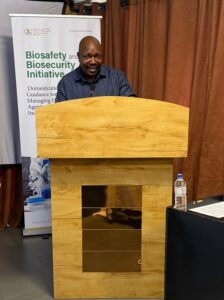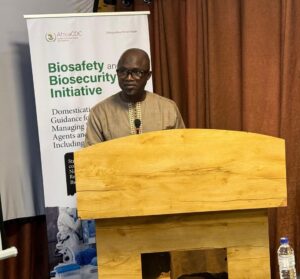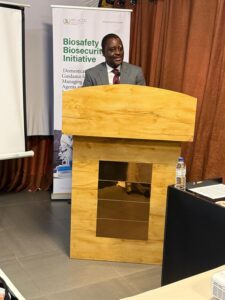The city of Banjul, Gambia, is this week hosting a pivotal health security meeting from August 4–8, 2025, aimed at strengthening the country’s ability to detect, monitor, and respond to biological threats. The technical workshop focuses on the domestication of the Regional Guidance for Listing and Managing High Consequence Agents and Toxins (HCATs), including the establishment of a national bio-surveillance system.
This important initiative is part of the Health Security Partnership to Strengthen Disease Surveillance in Africa (HSPA), funded by Global Affairs Canada under the G7-led Global Partnership Signature Initiative to Mitigate Biological Threats in Africa. Organized with support from the Africa CDC and the African Society for Laboratory Medicine (ASLM), the meeting has brought together multi-sectoral stakeholders committed to improving epidemic preparedness in Gambia.

The five-day workshop seeks to deliver two key outcomes: an approved, multi-sectoral national list of HCATs, and a national plan to establish and operationalize a bio surveillance system for priority pathogens. These efforts are essential for building a robust epidemic intelligence framework that can respond swiftly and effectively to both natural and intentional biological threats.
“Identification and management of high-risk pathogens, some of which cause the 200+ outbreaks we experience on the continent each year is a critical public health intervention,” said Mr. Donewell Bangure, Epidemiologist at Africa CDC. “The national list of priority pathogens paves the way for Gambia to build a comprehensive epidemic intelligence system.”

Dr. Momodou T. Nyassi, Director of Health Services, described the event as a landmark in the country’s public health journey. “This meeting marks a significant milestone in our collective efforts to contain biological threats and affords us the opportunity to develop a system tailored for The Gambia. Over the next few days, the shared expertise of the different stakeholders will be crucial not only to come up with a list of HCATs, but to develop a system to manage them effectively.”
During his address, the Director of Programs at ASLM, Dr Talkmore Maruta highlighted a critical gap revealed by the WHO’s Joint External Evaluation (JEE). “No African country has yet achieved a score above 3 in Core Capacity 7 (Biosafety and Biosecurity). This underscores the urgency for countries to identify, manage, and monitor high-consequence pathogens systematically.”

In response to this need, Africa CDC and ASLM have developed a Regional Framework to guide countries in developing national HCAT lists, and to support acquisition, storage, handling, and disposal practices across all One Health sectors. “Getting it right with the list sets a firm foundation for preparedness and response to any public health emergency, be it deliberate or accidental,” he emphasized.
Gambia joins a growing list of countries including South Africa, Zimbabwe, Namibia, Lesotho, Eswatini, Tunisia, Mali, and Botswana that are adopting this model to protect their populations and strengthen regional health security.
The success of this initiative is made possible through the generous support of the Government of Canada, the United Kingdom, the World Bank, and CEPI, whose contributions to the Africa CDC’s BSBS Initiative have been instrumental. Special recognition was also given to the people and government of Gambia for stepping up to lead on this vital health security issue.

